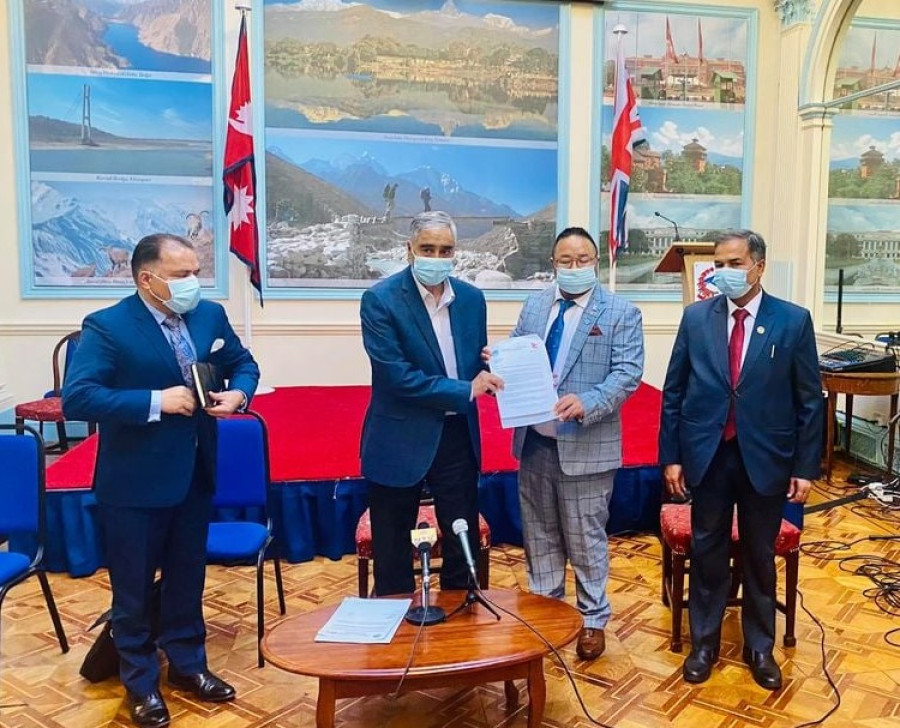Columns
NRNA’s brush with politics
The Nepali Congress’s interference in the NRNA’s internal matters is deplorable.
Naresh Koirala
Eighteen years ago, a few days before the first Non-Resident Nepali (NRN) Conference (NRN meaning people of Nepali origin living abroad), we were knocking on the doors of our politicians, lobbying for their support in restoring the rights of NRNs to live and work in Nepal and affirming our commitment to be a partner in Nepal’s socio-economic development. Our group included Upendra Mahato, Ram Thapa, Jiba Lamichhane and a few others. Mahato and Lamichhane later became president of the Non-Resident Nepali Association; Ram Thapa, the chief patron. We met GP Koirala and Sher Bahadur Deuba of the Nepali Congress, Pashupati Shamsher Rana of the Rastriya Prajatantra Party, and Madhav Kumar Nepal then of the CPN-UML. They all recognised the potential of the NRNs to assist in Nepal's development, and assured us of their support.
The first conference of NRNs, held in Kathmandu in October 2003, concluded with high hopes of collaboration between the government and the expatriate. It decided to establish the Non-Resident Nepali Association (NRNA) to represent and lobby for the welfare of the Nepali diaspora and mobilise it to accomplish Nepal's development ambitions. These were happy, exciting times.
The NRNA constitution, drafted soon after the conference, stated NRNA to be an "independent; non-profit; non-political; non-government". The non-political attribute is critical. A politically partisan organisation would not be capable of embracing the diversity in the diaspora. Also, partisanship presented the risk of creating division and conflict within the organisation.
From 2003 to 2021
The NRNA is now widely recognised as the official representative of the Nepali diaspora and a force in Nepal's development. It boasts 85 chapters, called National Coordination Councils, in as many countries. It provides a common platform to the diaspora to discuss Nepal-related socio-economic issues and mobilises Nepalis to assist in Nepal’s development in whatever way it can. NRN has become a household name in Nepal and amongst Nepalis around the world. In 2013, the Nepal government formally registered the NRNA as a social organisation.
The NRNA has, on several occasions, assisted Nepalis who have found themselves in legal difficulties in their country of domicile or trapped in troubled countries. It has promptly reached the ground when natural disasters like floods, earthquakes or pandemics hit Nepal. The funds provided to the Prime Minister’s National Relief Fund for flood relief and housing development for earthquake victims in Larpak village stand out. The NRNA assisted nearly 200,000 Nepalis scattered in some of the remotest countries to cope with Covid-19. It brought in hundreds of oxygen cylinders when the country was critically short of them.
According to Badri KC, senior vice-president of the NRNA, the total investment of NRNs in Nepal to be in the order of Rs50 billion. An NRN investment fund with a capital of Rs10 billion, expected to grow to Rs50 billion, was recently registered with the government of Nepal.
The NRNA has much to be proud of what it has achieved over the years, but it could have done a lot more if the government had done its part to encourage them; if the politicians had fulfilled the assurances they gave 18 years ago. The Non-Resident Nepali Bill is still pending in Parliament. The NRNA itself could do much better organisationally. Even after 18 years, it has failed to develop as an institution. Violent public brawls and allegations of vote buying during NRNA elections are becoming routine.
Despite its apolitical constitutional position, it has failed to stop political parties from intruding in its affairs, particularly during the election of its executives. Often, NRNs aspiring to lead the organisation are reported to have sought the support of political parties for their candidacy, thus opening the door for the politicisation of the organisation.
Politicisation of NRNA
Until recently, political parties were operating covertly to influence NRNA elections; in this year’s election, the Nepali Congress is doing it publicly. It has officially deployed a number of its senior leaders to mobilise support for its preferred candidate, and based on some complaints of irregularity in the selection of delegates for election, the Congress-led government of Prime Minister Sher Bahadur Deuba ordered the NRNA to stop its election which had been scheduled for October 20, 2021.
Reliable sources tell this writer that lobbying by one of the NRNA’s presidential candidates with direct access to the prime minister resulted in the mobilisation of Congress leaders and the government's order to stop the election.
Complaints about the eligibility of election delegates or candidates are not new. When this writer was the chief election commissioner in 2013, the Election Commission dealt with several complaints of irregularity. Resolution of conflicts is the organisation’s internal matter. The Congress should know it well. Recently, it dealt with several complaints regarding the validity of the methods used for the selection of delegates for its mahadhiveshan. There is still widespread disaffection in the Nepali Congress regarding delegate selection in some western districts. Yet, the mahadhiveshan is happening.
It is an utter shame that a party of the Nepali Congress’ history should blatantly disregard the NRNA’s non-partisan constitution and interfere in its internal matters. Even more shameful is that senior Congress leaders failed to stand up to the party bosses, and sheepishly accepted their dishonourable deployment. They should have known that the politicisation of the NRNA is on the margins of legality. The government approved constitution of the NRNA states it to be independent and apolitical. They should have known that the Nepali Congress’ priority should be in solving the numerous problems buffeting the country—from natural disasters to the malignant Supreme Court—not in politicising the NRNA.
Despite numerous organisational flaws, in the last 18 years, the NRNA has grown to be a representative organisation of the Nepali diaspora. Political parties will not stop attempting to interfere in its internal affairs. It is up to the NRNs to preserve the organisation's integrity and its non-partisan character. A politicised NRNA is a failed NRNA.




 8.79°C Kathmandu
8.79°C Kathmandu















